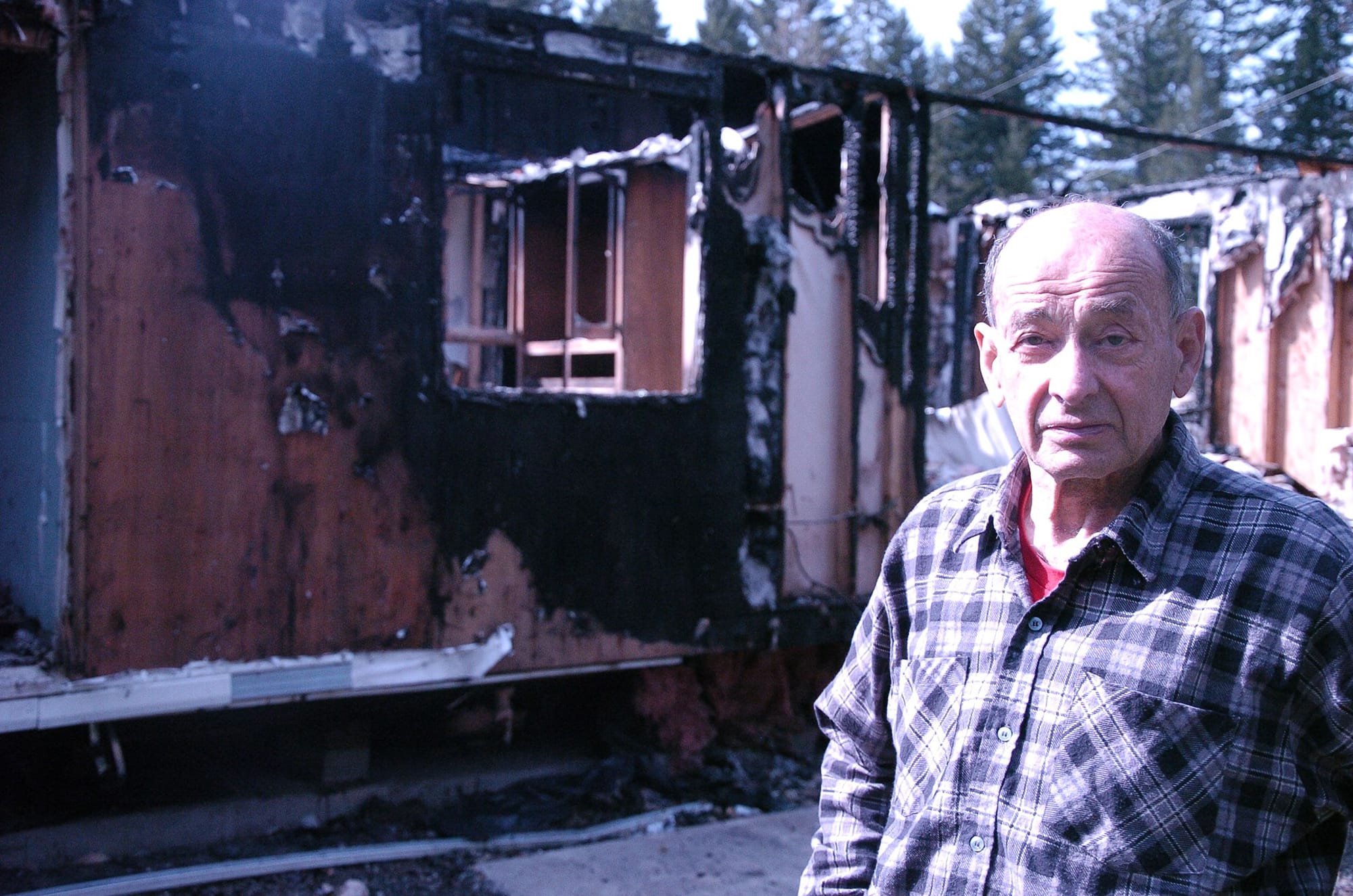LA CENTER — Nearly six months after Ed Rodda lost his house to a raging fire, the 74-year-old La Center man is stuck living alone in a beat-up trailer next to the charred wreckage.
Late in the afternoon of Oct. 3, Rodda’s neighbor, Mark Spritzer, spotted the blaze and ran across the street to the house to make sure Rodda and his 83-year-old wife, Marie, were safe. The fire started somewhere in the bedroom of their 1,565-square-foot mobile home, and the Roddas hadn’t even noticed the flames until Spritzer banged on their door and yelled for them to get out.
The couple escaped but stood outside stunned as the fire consumed the home where they had hoped to live out the rest of their retirement years in peace. Rodda called the fire department, and the first truck arrived at the remote area along Northeast 102nd Avenue nearly half an hour later, he said.
“Just as I was on the phone, the whole ceiling in that bedroom there fell in,” he said.
With a limited team and no nearby fire hydrants, firefighters managed to put out the flames using water tenders, but only a frail shell of the house remained.
The loss was unbearable for Marie Rodda, who has memory loss, her husband said.
“It just affected her mind,” Ed Rodda said. “She was out there sitting in the car, watching the thing burn.”
Difficult aftermath
The Roddas stayed across the street with Spritzer for a couple of days after the fire, and then the Red Cross put them up in a local hotel and gave Marie Rodda $160 for new clothes. The money didn’t go far, though, and one of Rodda’s daughters decided to move her up to a nursing home in Tacoma a short time later.
Ed Rodda said he has made a few trips north to see her there.
“If I come in the room, well, she can’t figure out who I am,” he said. “Sad state of affairs.”
After driving by the wreckage, a friend offered to hook Rodda up with the run-down 20-foot trailer, where he lives today, for just $500. Soon after, Rodda discovered leaks throughout the trailer, and he got to work replacing the entire plumbing system.
Throughout the winter, he tried to stay warm by huddling up next to two space heaters and attaching unburnt slabs of foam from the ruins of his house to the outer walls of the trailer to keep the heat in. He also spread a tarp — weighed down with gallon jugs of water — over the leaky roof to keep rainwater out.
Rodda said he never meant to stay in the trailer for so long, but now he’s not sure what to do.
“I’m working toward getting another house, but the money situation is terrible,” he said.
He recently began working with his insurance company to get a new house in Woodland, and even put a down payment on the property, he said. But some confusion over the timeline of the house payments arose between Rodda and the company, and the deal has been put on hold ever since, he said.
Spritzer has encouraged Rodda to seek an attorney to sort out the situation.
“I’m afraid at some point in time the county’s going to look at how he’s living and condemn it,” Spritzer said.
Meanwhile, Rodda has been told it will cost several thousand dollars to have the charred remains of his old house demolished, but he doesn’t have the money for it. After the fire, a local Boy Scout troop helped Rodda drag any potentially salvageable items out of his house and into his workshop nearby.
Daily living
Rodda pulled out his dryer and two washing machines, but they’re blackened from the smoke, and he hasn’t tested them to see if they still work. Soot and smoke soaked into his clothes and couch cushions, and laundry facilities refuse to wash them, because the stuff would leave a smoky scent in the machines.
Rodda said he has no idea what to do with all of it.
“Junk, I guess,” he said. “Bunch it all up and light it up.”
Now, Rodda spends his days doing odd jobs for his next-door neighbor, who lets him wash his clothes at his house in return. Rodda’s also been getting his meals from a local food bank and checking in with neighbors a few times a week to let them know how things are going.
After the fire, a group of neighbors showed some interest in donating clothes, furniture and other household items to help, said Daune Spritzer, Mark Spritzer’s wife.
The Spritzers sent out emails to other neighbors trying to coordinate the effort, but it’s all been put on hold until Rodda can get into a new house.
“Everybody in the area was willing to come up with something to put in his house,” she said. “People would help him, but there’s no place to put it.”




